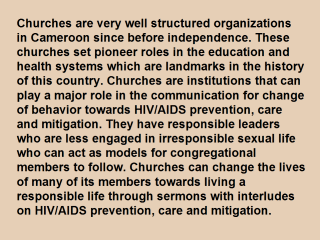 |
Our approach
is to use a strategy that will assemble a conglomeration of faith-based
institutions such as churches and mosques so that these religion
institutions will attack the HIV/AIDS problem from the same angle. This can
help churches, communities and the government to evaluate the HIV/AIDS
prevalence or infection rate through a change in behavior. About 90 %
Cameroonians comprising of 70 % Christians and 20 % Moslems attend
faith-based institutions which are good fora for HIV/AIDS intervention
programs that can improve communication for behavioral change. As Gedeon and
Laurel (2002) put it, the identification of the HIV/AIDS problem by the
community such as in churches and mosques is essential. It is small
projects, like this one, embedded in the community that can be scaled up
effectively. Churches in Cameroon lack the skill and
manpower to adequately address the HIV/AIDS scourge that is ravaging the
citizens especially the youths. We sought to build the capacity of
faith-based institutions (churches, mosques, traditional societies) through
their leaders, groups and the creation of AIDS clubs.
|
